He came from a land down under, couldn’t get to sleep, and told Johnny to “be good, be good”. Who can it be now? Colin Hay, of course, singer/songwriter for Men At Work, the Australian band which burned bright for a few years in the early 80’s.
After Men At Work stopped working, Hay continued sharing his music with the world in an acclaimed solo career, which got a nice boost from having his songs used on the TV show Scrubs. His most recent solo album, Next Year People, came out earlier this year.
This interview was for Colin Hay’s concert at the Lobero Theatre on 9/19/15, as part of the Sings Like Hell series. It was done by phone on 8/31/15.
Jeff Moehlis: What can people look forward to at the upcoming concert?
Colin Hay: I’m suspecting that they’re looking forward to being entertained, and hearing the reproductions of songs that they already know. You know, unlike jokes, if somebody tells you a joke you think, “OK, that’s a good joke.” If somebody tells you the same joke, you stop them and you say, “Hey, I’ve heard that joke. Don’t bother.” But it’s different with songs. You know, people like to hear songs over and over again. So I tell stories and sing songs. That’s what I do.
I’m going to have a little band with me this time, which I don’t always have. I’m going to have a guy called San Miguel Perez-Rodriguez on tres guitar, a bass player called Yosmel Montejo – two Cuban guys who are fantastic musicians. And a drummer called Charlie Paxson, and my wife Cecilia Noel. So they’ll come on, and it’ll be like a little acoustic band.
JM: I saw you do a solo show here in Santa Barbara in 2008, at a place called SOhO. You just mentioned jokes – I remember one story in particular that you told that involved goats. Any chance that we’ll hear any goat stories when you return to Santa Barbara this time?
CH: So you’re redefining my theory? You want to hear the jokes again?
JM: I do!
CH: There you go. See, I’ll have to rethink that.
JM: Well, if they’re good jokes, they’re worth hearing again.
CH: Sometimes they are. Yeah, sometimes they are. I used to love to go and see Mitch Hedberg years ago. He was my favorite comedian. It didn’t matter whether I’d heard the jokes, you know, fifty times. It didn’t really seem to matter, I still enjoyed them.
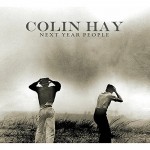
JM: You have a new solo album that came out earlier this year. Can you tell us a little bit about how that album came together?
CH: It came together much like they all do. You think to yourself, “Oh, I’d better make a record. It’s been a while.” An old-fashioned approach. I don’t know if it’s really worth making albums anymore, but people seem to like them at shows. You can do them in vinyl, which is nice for a niche market.
People seem to stream songs these days as opposed to full records. But I still like making records, I still like the process of making albums. Maybe I’m just used to it. Maybe it’s just because that’s what I’ve always done. You tend to stay with something unless there’s a better alternative. But I have a studio at home. I was writing, I thought, pretty interesting songs with a friend of mine mainly, a guy called Michael Georgiades who lives up the road from me. I was surrounded by a bunch of great musicians, so that’s really how it came together. We’d write a song and go in the studio, and cut the tracks pretty live. I had a grand old time making this record. Very good.
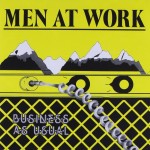
JM: I grew up when you guys were on MTV, and I always enjoyed when your videos came on. What are your reflections on the first Men At Work album, Business As Usual, and that era of music videos?
CH: Well, obviously for us it was a very exciting time. I mean, that period for me was an extremely exciting time for many different reasons. For one thing, you know, I was 27 or 28 years old, which is a pretty exciting time in your life. You’re not a teenager, but you’re not middle aged. You’re kind of in this growth period. I think that time in your life seems to be quite a natural time for making some kind of mark on the world, if you’re going to make it. What I mean by that is just really establishing a relationship with yourself in a way, and just thinking, “OK, what am I going to do with my life?” and then going for it.
During that time, I realized that the songs I was writing I thought were getting better, so I hit this kind of growth spurt, which coincided with the band. Everything seemed to be synchronistic. All the dots joined. It seemed like a period for me where, you know, you’re in it and you’re creating it, but on another level you’re just really trying to stay on the wave. You’re being swept along by something which was really beyond human endeavor and understanding, in a way.
We met up with friends of ours who made videos. We didn’t have any money, so we just had to inject some kind of personality into them. We had a great American record producer [Peter McIan] who produced the songs in a way that gave them a shot. They sounded good, they sounded accessible, but still hopefully with the integrity of the band intact, which I think happened.
Everything happened in a very, very exciting way, so I have great memories from that period. You know, there was lots of other things going on. Of course, the MTV thing started, which really made it undeniable for us. But before that we were being played on the radio a lot, and we got a tour opening up for Fleetwood Mac, so it was a fantastic time for me. Very exciting.
JM: Fast forwarding a bit, it was cool to see you pop up on the TV show Scrubs, somewhat unexpectedly. How did you get that gig?
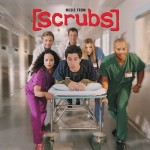
CH: A lot of good things that have happened for me happened through playing at The Largo in Hollywood, which is where I would play. Zach Braff came down to see me play, before he was in Scrubs, before the television show existed. So he had seen me and had a few of my CDs, and then he got the gig in Scrubs and said he would see what he could do to get some of my songs on the show, which he did. He brought Bill Lawrence down, who created the show, and he liked the songs, and couldn’t understand why they weren’t on the radio. I couldn’t understand either. So he said, “I’ll use some on my television show and see if that makes a difference.” So that’s what he did. That’s how it happened.
He loved the song “Overkill”, so he wrote an episode called “My Overkill”, which I think was the first episode of the second season. It was a good show to be involved with, because it was still in some ways a little cult-y, it was a cool show, there was nothing wrong with it. I was very happy to be involved with it. And indeed, it did a huge amount for my career. You know, you can only do so much when you’re going on tour. In a lot of ways, you’re often playing to the converted, playing to people who already know what you’re doing. So Scrubs opened up a whole new audience for me, so I was very grateful for that.
JM: One of the songs that was on that show, and on the soundtrack CD, was “Beautiful World”. Can you tell me the story behind that song?
CH: I was driving across Topanga Canyon, and I wrote the song in my head. It was really to do with giving up drinking, and having a lot of time on your hands and having to look around yourself and be more aware of the present moment, and trying to ritualize the simple things in life. It’s almost like going through that process where you rediscover things, to some degree you’re looking at the world in more of a childlike way, in a sense, instead of through an alcoholic fog.
I came over to the States – I ran away from Australia to some degree – and it was really about starting again, and wiping the slate clean and rediscovering who you are, and all that, and trying to give myself a reboot.
JM: I’d be happy if that makes it onto your setlist in Santa Barbara.
CH: Yeah, people like that song. I always play that song. I play it because it just floats along, it kind of works in many different ways. It’s always fun to play. A lot of people know it. So it always makes it to the setlist.
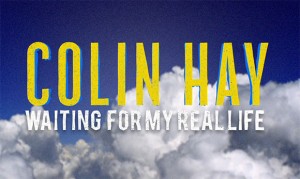
JM: I understand there’s a new documentary out about you and your career [called Waiting For My Real Life]. Were you involved directly with the production of that? And how does it feel to see your life told on the bigscreen like that?
CH: I haven’t even seen the final version of it yet. It’s out to some degree. Nate Gowtham, the director, and his partner Elizabeth [James] are trying to get it seen. I don’t really understand that world too well, but it’s much the same as trying to sell anything. You have to go out there and try to get it accepted at the festivals, and so forth. Like a lot of things, there’s a lot of competition to get something exposed like that.
[Unfortunately, Colin’s further thoughts on the movie are lost due to static on the line and a lost connection. But he did call back…]
JM: What advice would you give to an aspiring musician?
CH: Probably not a lot. I don’t know about the value of advice [laughs]. You know, there are lots of things you could say to people. My experience with people is that you give advice, you get advice, you look around, and then you just go forward and you make your own mistakes like everybody else. In some ways, I think the best people always seem to forge their own path, and look around and try to negotiate the obstacle course of whatever it is that they’re doing.
I mean, I would say to someone the really obvious thing, that you have to tell yourself the truth [laughs]. Assuming you have talent, you have to tell yourself, you have actually in that sense tell yourself the truth. There’s no point in listening to what other people say, really. You know it yourself, what you have and what you have to offer.
And then you just have to work hard, and you have to practice. I would encourage people to practice as much as possible, and to play as much as possible, and to play in front of an audience as much as possible, because that is becoming more and more what sets people apart, your ability to draw an audience and entertain people in whatever way you’ve chosen to do it.
I gave up piano when I was young – that’s my biggest regret. And I never practiced enough at guitar. Then I started writing songs. Even now, I wouldn’t say I’m struggling to become a better guitarist, but I’m endeavoring to become a better guitarist. That’s more than anything really want I want to do, just be a guitar player, you know?
I would hesitate to give someone advice, and I certainly wouldn’t give anyone advice unless they specifically asked me. But, yeah, I think you really just have to be honest with yourself, and just get on with it [laughs]. Shut up and get on with it!
JM: What are your plans, musical or otherwise, for the near future? Are you writing new songs already, or are you focused on touring for now?
CH: Yeah, I’m doing those things. I’m going on tour, and I’m writing songs, and trying to enjoy myself. I have a little time off, and I rarely have time off, so I’m trying to get used to the idea that I actually don’t have to get up and achieve something every day. I can relax for a couple of weeks. There’s new songs poking their head up, but nothing’s forced. I’m going on tour with Barenaked Ladies to Europe, and I’m doing a fall tour. Things are just kind of cruising right now.
JM: Even though you’ve lived in America for a while, my guess is that you’re still plugged into the Australian music scene. What are some of your favorite Australian bands and artists that we’ve missed out on in America?
CH: Well, you should have a look at Courtney Barnett. I think she’s fabulous.
JM: Any others, maybe going back to when you were growing up there?
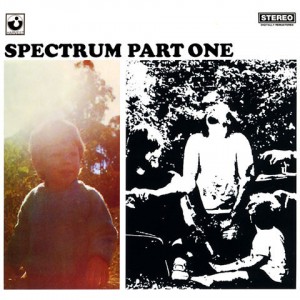
CH: Yeah, there are lots of bands that never really saw the light of day in the rest of the world, that I grew up with. My favorite band in Australia – Melbourne, when I was growing up – was a band called Spectrum. They were just fantastic. If you can pick up a couple of Spectrum records, they’re really excellent. In the 70’s, there was a great blues band called Chain, as well, a Melbourne band. There were lots of great Melbourne bands. Renee Geyer, a fantastic vocalist from Melbourne, an unbelievable singer. There you go. Paul Kelly – of course people know who Paul Kelly is. He’s one of the great songwriters in the world.
JM: Last question – where are you speaking to me from?
CH: I’m down in Los Angeles.
JM: Your adopted hometown, right?
CH: Yes, indeed.

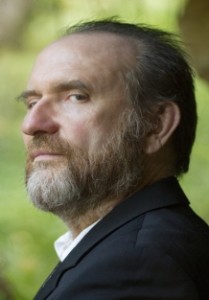
Sweet interview, Jeff! Fun to read ;)